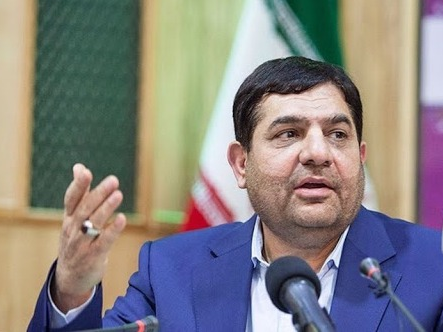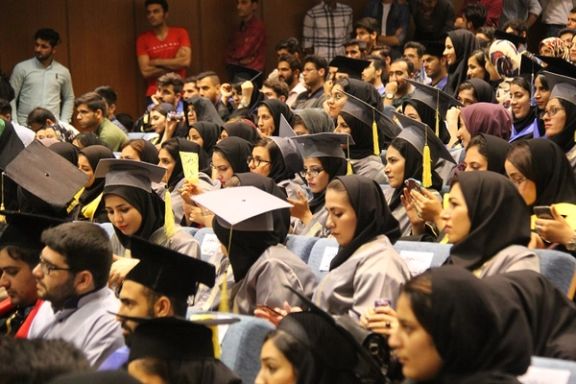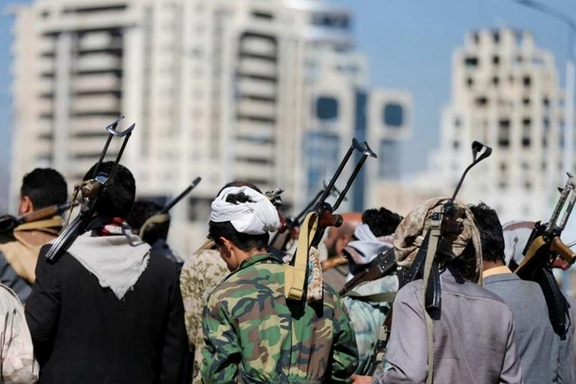Raisi Aide Says Without Iran No Power Can Make A Decision About Mideast

Iran’s first vice president said Sunday that the Islamic Republic has become so powerful no regional or world power can make a decision without Tehran.

Iran’s first vice president said Sunday that the Islamic Republic has become so powerful no regional or world power can make a decision without Tehran.
Mohammad Mokhber claimed that before the 1979 revolution, Iran was not a player in the regional balance of forces, while now “the Islamic Republic has the first and the last word.”
Before 1979, Iran had the most modern army after Israel in the Middle East and was considered the gendarme of the region. After the fall of monarchy, the Soviet Union invaded Afghanistan in December 1979 and Iraq attacked Iran in September 1980, in what was seen as the result of a serious power vacuum in the region.
Mokhber once again claimed that the IRGC navy seized a Vietnamese-flagged tanker taken by the US Navy in October. The United States had dismissed Iran’s claim and said its navy only observed Iranian forces seizing the tanker in the Sea of Oman.
In other remarks, Mokhber appeared to concede that the centralized economic model of the Islamic Republic has been a failure. “We did not give control of the economy to the people, and we got into trouble,” but he insisted that the Revolutionary Guard’s paramilitary force Basij is the best vehicle to transfer control to the people.

The commander of IRGC's navy says that in clashes with the US Navy 9 of its sailors have been killed, without providing details or timing of any fatal incident.
Admiral Alireza Tangsiri speaking in gathering in on Sunday said the Revolutionary Guard navy had “nine martyrs” in direct clashes with the US Navy but has been able to “slap America nine times”.
He did not elaborate if he was speaking about one incident or several encounters over a period of time, but his reference to slapping America nine times clearly pointed to a string of incidents over several years.
As an example of how Iran slapped America, Tangsiri referred to an incident in October when according to Iran its navy stopped the US “stealing oil from a tanker” and it seized a Vietnamese-flagged vessel and brought to port.
At the time the US said the only incident it observed was Iran seizing a tanker and did its navy did not intervene.
Iran carried on with its claims of victory against the US Navy for a few days, providing conflicting version of the story.
Tangsiri also said that due "some considerations" several clashes between Iran and US forces has never been disclosed.
The US has never reported a serious engagement and trading of fire with the Iranian Navy, except warning shots in the past. In May, a US Coast Guard cutter fired 30 warning shots at two IRGC fast-attack boats. In April also US warships fired warning shots.
Revolutionary Guard speedboats and lately drones and helicopters periodically harass US Navy ships in the Persian Gulf or the Sea of Oman.
During the Trump Administration naval encounters with Iran were common. The only serious incident was in July 2017 when a US warship fired two warning shots at Iranian armed speedboats.

Critics say President Ebrahim Raisi's wrong choice of officials will hurt efforts to attract foreign investment and is prompting talented Iranians to emigrate.
Hossein Kashefi, the former chief of the Parties House, an umbrella organization that regulates relations among political parties, has said in an interview published by Arman newspaper on November 20 that the way Raisi is running the affairs of the state is not likely to instill hope for promising and essential change in Iran.
In recent weeks, many politicians and commentators from across Iran’s political spectrum have begun criticizing the president for inaction as prices rise and more people fall into poverty.
Kashefi said when Raisi was setting up his cabinet before his inauguration in August, only reformists were unhappy about the choices he was making, but now most of the critics of his cabinet's makeup are conservatives, like those who rejected his latest choice for the post of education minister in parliament last week.
Raisi's lack of success in bringing about positive change in people's lives, which is partly because of his wrong appointments, would dissuade foreign investors from coming to Iran, while foreign investment would be crucial in overcoming the current economic crisis, which is what the people want from the president, Kashefi said.
Kashefi added that choosing the right managers and ministers is key to such improvement, but he did not talk about the negative impact of US sanctions on foreign investment in Iran. However, he vaguely pointed out that only an improvement in the country's foreign policy could have prompted foreign investors to show an interest in Iran.
Meanwhile, he pointed out that nepotism in the Raisi administration that appears to be the most important factor leading to choosing the wrong people, and the fact that he has chosen individuals based on their kinship and political affiliation rather than their qualifications has prompted elite executive workforce to leave the country.
Raisi tweeted in response to similar criticisms following the rejection of his latest choice for the Minister of education in a November 17 tweet that he chooses his colleagues "not based on friendship or kinship or under pressure from the media," adding that he chooses his colleagues "based on their qualifications."
Several Twitter users rejected Raisi's argument in their comments. One reader responded: "But your performance and your choices for your cabinet are contrary to this commitment and what you promised in your election campaign. Your cabinet ministers either lack qualifications." Another user commented: "It is probably sheer coincidence that all of your ministers come from the Imam Sadeq University or are the sons-in-law of Tehran Mayor Alireza Zakani."
On the same day, Supreme Leader Ali Khamenei's official Twitter page also posted a tweet that said, "There are elements in some universities who encourage highly talented young persons to leave the country. I say clearly that this is an act of treason."
Users wrote tens of comments that disagreed with Khamenei's view on the reason why young and talented Iranians leave the country for good. One user wrote: "You are the first and last reason why young people leave the country. You have ruined this country."
Another Twitter user wrote: "They will leave their country as long as they cannot get a job unless they have connections with insiders or are the sons-in-law of well-connected people." Many other users referred to two young elite students, Ali Younesi and Amir Hossein Moradi, who have been jailed and tortured on vague political charges. Still another user reminded Khamenei in reference to similar cases: "The real traitors are those who arrest and imprison the talented people for fictitious charges without thinking of the consequences of what they do."

Yemen's Iran-backed Houthi movement said on Saturday it had fired 14 drones at several Saudi cities, including at Saudi Aramco facilities in Jeddah.
There was no immediate Saudi confirmation. Saudi Aramco, the state oil firm, said when contacted by Reuters that it would respond at the earliest opportunity.
The Houthi military spokesman said in a televised press conference that the group had also attacked military targets in Riyadh, Jeddah, Abha, Jizan and Najran.
The Houthis have intensified their missile and drone attacks at Saudi Arabia this year, while the Biden Administration removed the group from its terrorism designation and urged Riyadh to try harder for an agreement over Yemen.
The Saudi-led coalition attacked Iran-affiliated targets in Yemen on November 17 after intercepting a drone that attempted to attack an airport in Saudi Arabia on Thursday.
The coalition was taking "operational measures to deal with the sources of hostile cross-border attacks," Saudi state news agency SPA reported.
Secret locations of Iranian Revolutionary Guards and Lebanese Hezbollah forces were targeted.
Reporting by Reuters

Bahrain's foreign minister, Abdullatif Al Zayani, said on Saturday that Lebanon needs to demonstrate that its powerful Iran-allied Hezbollah movement can change its behavior to mend a rift with Gulf Arab states.
Lebanon is facing a diplomatic crisis with Gulf states, triggered by a minister's critical comments about the Saudi-led intervention in Yemen that prompted Saudi Arabia, Bahrain and Kuwait to expel Lebanon's top diplomats and recall their own envoys.
Concerned about Hezbollah's growing influence, Gulf states - traditional aid donors to Lebanon - have been withholding support to the country which is suffering a deep economic crisis.
"We (can) extend support and try to find solutions in the future, but once it is demonstrated that Hezbollah can be changing its behavior," Zayani told the IISS Manama Dialogue security forum in Bahrain.
Riyadh, locked in a regional rivalry with Iran, has said its measures last month against Lebanon, including an import ban, were not only in response to the minister's remarks, but were also to demonstrate unease over Hezbollah's "domination" of Lebanese politics.
Lebanon's newly appointed information minister George Kordahi said his remarks were made in an interview before he joined the cabinet and has refused to apologize or step down. Hezbollah's leader has supported him in the diplomatic row and rejected calls for his resignation.
Report by Reuters

Unknown perpetrators hurled an incendiary device at the entrance of Iran’s consulate in the northern German city of Hamburg Friday, which is being investigated.
The attack that took place in the Winterhude district resulted in some damage to the building, but no one was reported hurt.
Local media say since there is strong likelihood of a political motive, German security agencies are involved in the investigation.
The incident coincides with the anniversary of November 2019 protests in Iran when security forces killed hundreds of demonstrators. Opposition groups have been holding gatherings in Hamburg on Friday and Saturday.
Although many diaspora Iranians oppose the Islamic Republic, attacks on Iran’s diplomatic missions are not common.